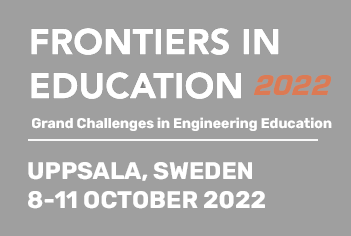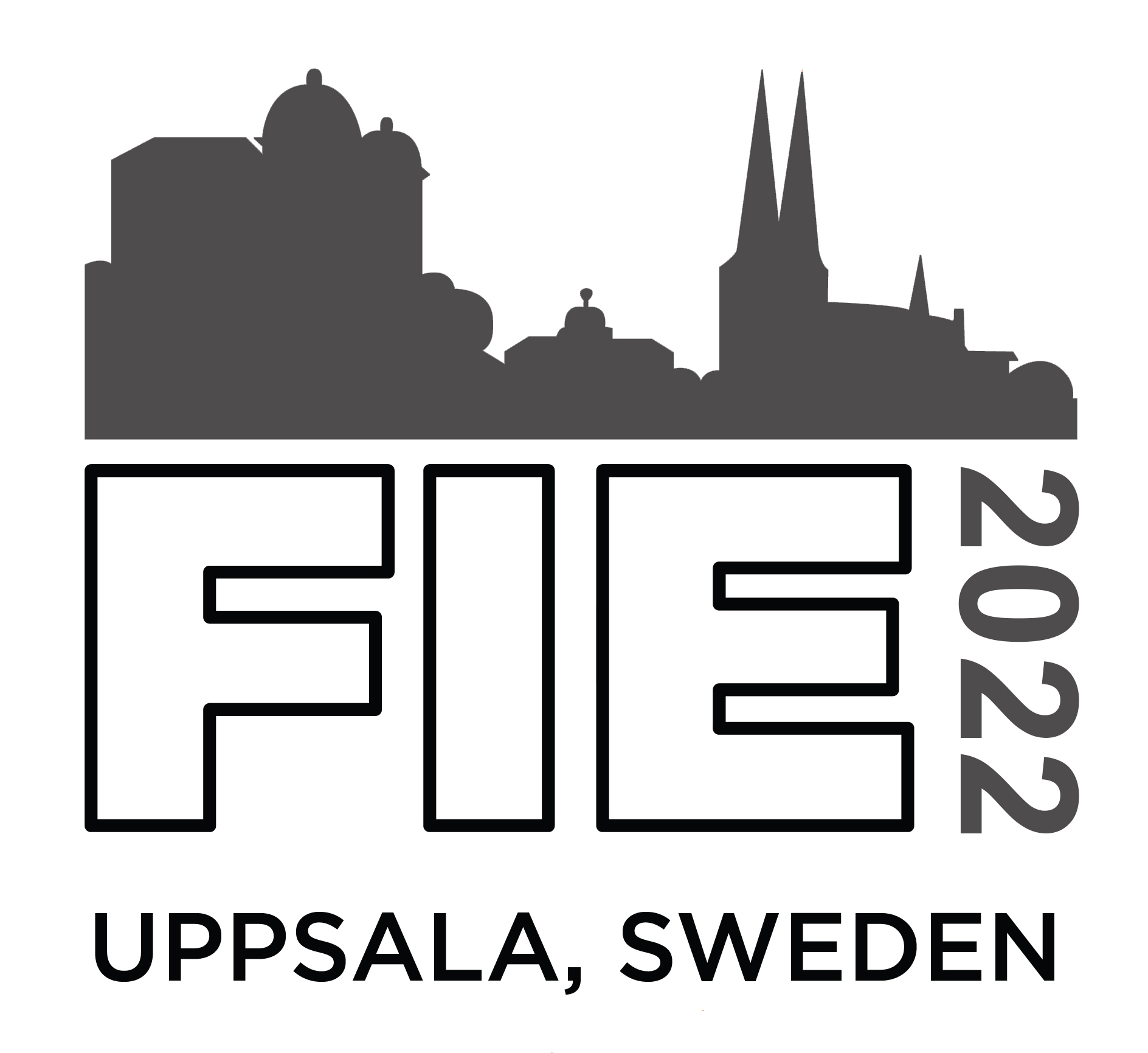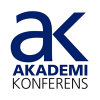
Call for Abstracts
We encourage authors to consider the FIE 2022 conference theme of “Grand Challenges in Engineering Education”
4 February 2022:
Given the overlap with the ASEE Annual Conference paper deadlines, we are happy to announce that we have extended the deadline for abstract submissions to February 14, 2022 (24:00 CET). At this time, FIE 2022 is scheduled to be an in-person meeting in Uppsala, Sweden October 8-11, 2022. Options for remote attendance are under discussion and the outcome, including information on conference fees, will be announced here on the website.
Detailed instructions
Jump to instructions for a presentation type by clicking the buttons below
Full Papers and Work-in-Progress
FIE welcomes Full Papers up to eight-pages and Work-in-Progress Papers up to four-pages that address the broad tracks of (1) innovative practice, (2) research-to-practice, and (3) research. Work-in-progress papers are typically in frontier areas where it is understood the work is in an early or intermediate stage and authors are seeking feedback from the community. Further, FIE welcomes proposals for panels, workshops, and special sessions to disseminate scholarly efforts in non-traditional ways.
The anticipated audience for FIE represents a broad spectrum of backgrounds. Attendees cover all disciplines relating to engineering and computing education and come from a variety of institutions and organizations worldwide. Typical interests range from education research to extending promising results into their own educational settings. Attendees are eager to learn not only of your results but how your results might be applied in their particular discipline at their particular institution.
We encourage authors to consider the FIE conference theme described on the conference website while also considering a track type that their paper aligns with. When submitting your paper to the conference website, you will select the relevant track from the dropdown list. Below are the main tracks prevalent at the FIE conference along with example areas within each, but these are not limiting:
1. Professional Development
1.1 Personal and Professional Development
1.2 Teaming and Teamwork
1.3 Competency and Applied Learning Theory
2. Diversity and Broadening Participation
2.1 Ethics and Thinking
3. Pedagogical Approaches
3.1 Gamification
3.2 Project based learning
3.3 Instructional Methods
3.4 Collaborative and Active Learning
3.5 Applied Learning Theory
4. Remote/Online Teaching and Learning
4.1 Online and Learning Technologies
4.2 Online Learning and Teaching
5. Computing
5.1 AI and Machine Learning
5.2 Algorithms
5.3 Computing and Professional Skills
5.4 Data Science
5.5 Cybersecurity
6. Student Perspectives
6.1 First Year
6.2 Improving Student Thinking
6.3 Capstone and Design
6.4 Affective Domain
6.5 Innovation and Creativity
7. Curriculum and Course Development
7.1 Electrical and Computer Engineering
7.2 Information Systems
7.3 Business of Research
7.4 Competency Development
7.5 Assessment Techniques
7.6 Culture of Teaching and Learning
8. K12 STEM Education
9. Others
Finally, you should categorize your paper as:
- Innovative Practice
- Research-to-Practice
- Research
Please note that one author from each paper is expected to register for and participate in the full conference. These categories influence the overall structure and contents of the submitted work. Each category follows with suggestions for expected paper contents.
1. Innovative Practice Category
The innovative practice category is for scholarly proposals of reflective or novel practice in engineering and/or computing education. Excellent proposals are well situated in prior literature on teaching and learning and outline an innovation of value and interest to engineering and/or computing educators.
Abstracts: Innovative Practice Abstracts should be 300-500 words and should clearly present the paper’s relevance to engineering education and how the work is innovative.
Each abstract must briefly state the specific contribution of the paper to the innovative practice of engineering and/or computing education. Contributions may be made in various forms, and should include a description of what is unique about the innovative practice, how the innovative practice differs from and builds on previous practice as documented in the literature, and new ideas that conference participants would take away from this paper. The abstract should describe the setting for the innovative practice in the broad context of engineering and/or computing education, (not necessarily the particular institutional context), motivations for the innovative practice, and the results obtained. Abstracts must present the paper’s relevance to engineering and/or computing education and how the work is innovative.
2. Research-to-Practice Category
The research-to-practice category is for scholarly proposals that outline applications of research in engineering and/or computing education. Excellent proposals are well situated in the theoretical framework(s) that support teaching and learning and apply these theoretical frameworks to the practice of engineering and/or computing education.
Abstracts: Research-to-Practice Abstracts should be 300-500 words and should clearly present the theoretical frameworks of teaching and learning being applied, and the implications for the practice of engineering and/or computing education.
Each abstract must briefly state the specific contribution of the paper towards illustrating how engineering and/or computing education research informs educational practice. Contributions may be made in various forms, but they should describe the setting for the practice in the broad context of engineering and/or computing education, (not necessarily the particular institutional context), motivations for the practice, research that supported the practice, and results obtained. Abstracts must outline the theoretical frameworks that inform the practice and state the implications for educational practice with a focus on action.
3. Research Category
The research category is for scholarly proposals that outline contributions to research in engineering and/or computing education. Excellent proposals are well situated in prior literature on teaching and learning, and outlines research methods and findings of value and interest to engineering and/or computing educators.
Abstracts: Research Abstracts should be 300-500 words and should clearly present the paper’s research contribution and its relevance to engineering and/or computing education. Each abstract must state the specific research contribution of the paper. Contributions may be made in various forms, and should include the research questions addressed, methods used, and results found, and a description of how the results build on prior research. Abstracts must provide a summary of the research contribution/expected results and brief statement of the implications for educational practice with a focus on action.
Special Sessions
Special sessions are intended to be creative, non-traditional, interactive ways to engage engineering and computing education professionals in the frontiers of education. These sessions are ~80 minutes in length and are intended to be of value to FIE Conference attendees, enhance the experience and knowledge of the session participants, and help advance the frontiers of engineering and computing education.
Approval Procedure
To be approved to offer a special session, facilitators/authors will need to 1) submit a special session proposal abstract (800-1000 words) via the conference submission website and 2) if the abstract is approved, submit a paper (4-6 pages) that provides sufficient detail to give attendees a sense of what to expect during the session and motivate them to attend.
The initially submitted proposal abstract for a special session will be reviewed to determine if it is an appropriate fit for the FIE conference. If the proposal passes the first review, the facilitators/authors will be invited to submit a full paper draft that conforms to the required IEEE format for the conference. This full paper will undergo a more thorough, second round of peer review. Following the second round of peer-review, facilitators/authors will be notified of acceptance/rejection and any final requested edits prior to final paper submission. Please see the conference website for a list of relevant deadlines.
Expected Content
Both the special session proposals abstracts (800-1000 words) and the full paper (4-6 pages) must include each of the following elements. An approximate word count for each section of a proposal abstract is provided and can be scaled for the full paper, if accepted.
- goal(s) of the session, including a description of the anticipated audience (community), and why they would be interested in the session (approximately 100-200 words)
- a description of special session, including the topics/subjects/content of the session in the context of the relevant literature (approximately 200-300 words)
- a justification for why the proposed session is novel and/or thought provoking (approximately 100 words)
- an explanation of the interaction expected during the session and a session agenda that includes details and approximate time allotted for each activity, up to 80 minutes total (approximately 150 words)
- a description of the expected outcomes, and future work as a result of this session (approximately 50 words)
- brief biographies describing the expertise of the facilitators/speakers/panelists/organizers (approximately 100 words)
Additional Information
- FIE Workshops are no cost to FIE registrants, but they are required to register to help obtain a headcount estimate. There is an additional cost for non-FIE registrants, listed in the registration table.
- All organizers and presenters in panels and special sessions are expected to register for and participate in the full conference.
- Additionally, because special sessions are partly evaluated based on the expertise of the facilitators, special session submissions should be prepared for single-blind review (i.e., the authors and affiliations should be identified).
- Papers should adhere to the required IEEE formatfor the conference. Templates are available on the conference website.
Pre-Conference Workshops
Pre-Conference Workshops can provide participants with an opportunity to extend their knowledge and strengthen their skills in the area addressed by the workshops. These sessions provide additional time for interaction with participants since they are allotted three-hour time slots during the workshop day scheduled outside the regular conference blocking. Pre-conference Workshops should provide a collaborative, active learning environment for the attendees. Attendees should leave with skills, knowledge, or materials that they can use in their own teaching practice or scholarship of learning and teaching.
Approval Procedure
To be approved to offer a pre-conference workshop, facilitators/authors will need to 1) submit a special pre-conference workshop proposal abstract (800-1000 words) electronically via the conference submission website and 2) if the abstract is approved, submit a detailed outline of the workshop (~4 pages) that provides sufficient detail to give attendees a sense of what to expect during the session and motivate them to attend.
The initially submitted proposal abstract for a pre-conference workshop will be reviewed to determine if it is an appropriate fit for the FIE conference. If the proposal passes the first review, the facilitators/authors will be invited to submit a workshop outline draft that conforms to the required IEEE format for the conference. This full paper will undergo a more thorough, second round of peer review. Following the second round of peer-review, facilitators/authors will be notified of acceptance/rejection and any final requested edits prior to final paper submission. Please see the conference website for a list of relevant deadlines.
Expected Content
Both the pre-conference workshop proposals abstracts (800-1000 words) and the detailed outline (~4 pages) must include each of the following elements. An approximate word count for each section of a proposal abstract is provided and can be scaled for the detailed outline, if accepted.
- the contact information (name, affiliation, and email) for each anticipated facilitator or presenter in the workshop
- goal(s) of the Pre-Conference Workshop and how these goals align with the goals of FIE
- a description of topics/subjects/content of the workshop situated in the context of relevant literature (approximately 200-300 words)
- an explanation of the qualifications of each presenter to leading the workshop (approximately 100-200 words)
- an explanation of the interaction expected during the session and a session agenda that includes details and approximate time allotted for each activity, up to three hours total (approximately 150 words)
- a description of the anticipated audience and the maximum number of people you would prefer to participate (approximately 100 words)
- a description of the take-away skill, knowledge or material that attendees will acquire (approximately 100-200 words)
- Any special requirements for electricity, audio-visual equipment, or materials.
- Any additional anticipated fee for attendees to cover materials and supplies. The FIE committee may impose additional fees to cover facility expenses.
Additional Information
- Pre-conference Workshop presenters will submit an outline and supporting documentation for the workshop, rather than a formal paper.
- Pre-conference Workshops detailed outlines will be peer-reviewed by at least three reviewers.
- Pre-conference Workshops detailed outlines should adhere to the required IEEE formatfor the conference. Templates are available on the conference website.
- Additionally, because workshops are partly evaluated based on the expertise of the facilitators, the submissions should be prepared for single-blind review (i.e., the authors and affiliations should be identified).
- Pre-conference Workshop presenters must register for and attend the conference.
- Pre-conference Workshop attendees must pre-register for workshops. You may charge an additional fee to cover workshop materials.
Panel proposals
Panel sessions are intended to engage the engineering and computing education community in multiple perspectives on a given issue on the frontiers of education. These are ~80 minutes in length; the number of panel sessions offered is limited. These sessions are intended to have a broader impact on engineering and computing education by bringing together multiple perspectives on a given topic. The sessions should be of value to FIE Conference attendees, enhance the experience and knowledge of the participants, and help advance the frontiers of engineering and computing education.
Approval Procedure
To be approved to offer a panel session, organizers/authors will need to 1) submit a panel session proposal abstract (800-1000 words) and 2) if the abstract is approved, submit a paper (4-6 pages) that provides sufficient detail to give attendees a sense of the significance of the topic being covered and motivate them to attend.
The initially submitted proposal for a panel session will be reviewed to determine if it is an appropriate fit for the FIE conference. If the proposal passes the first review, the facilitators/authors will be invited to submit a full paper draft that conforms to the required IEEE format for the conference. This full paper will undergo a more thorough, second round of peer review. Following the second round of peer-review, organizers/authors will be notified of acceptance/rejection and any final requested edits prior to final paper submission. Please see the conference website for a list of relevant deadlines.
Expected Content
Both the panel session proposals abstracts (800-1000 words) and the full paper (4-6 pages) must include each of the following elements. An approximate word count for each section of a proposal abstract is provided and can be scaled for the full paper, if accepted.
- a description of topics/subjects/content of the session and its significance in the context of the relevant literature. (approximately 200-400 words).
- the goal(s) and anticipated outcomes of the panel session and the rationale for why these goals and outcomes are better served by a panel session (approximately 100-200 words).
- a description of the anticipated audience (community), and why they would be interested in the session (approximately 100-200 words).
- the names and institutions for each proposed panel member (typically 3-5) and panel organizer/moderator (Note: members of the panel are the people who provide different perspectives on the issue being addressed by the panel. They are critical to the quality of the panel session and therefore some detail on panelists’ expertise is needed in order to evaluate proposal quality). (approximately 100-200 words).
- If applicable: a brief description of any proposed peer-reviewed full papers from panel members to accompany the Panel session at the FIE conference (Note: these abstracts and papers will be submitted separately, but should indicate that they are associated with “Panel Name”). (approximately 50 words).
Additional information
- All organizers and presenters in panels and special sessions are expected to register for and participate in the full conference.
- Additionally, because panel sessions are partly evaluated based on the expertise of the organizers and panelists, special session submissions should be prepared for single-blind review (i.e., the authors and affiliations should be identified).
- Papers should adhere to the required IEEE format for the conference. Templates are available on the conference website.
Contact
Academic Conferences
Phone + 46 (0) 18 67 10 03
E-mail: fie2022@akademikonferens.se
(for practical questions about your registration)
AppInConf
E-mail: abstracts.fie2022@appinconf.com
(for questions about abstract submission)
Important dates
February 14, 2022
Abstract Submission Deadline
March 7, 2022
All Acceptance Communications
April 25, 2022 (Extended deadline)
Preliminary Paper, Special Session and Panel Summary Papers, and Workshop Outlines, Submission Deadline
June 10, 2022
Notification of Paper Revision Requirements and Final SSPCW Acceptance Communication
July 5, 2022 (Extended deadline)
Revised Paper Submission (major revisions)
July 18, 2022 (Extended deadline)
Peer Review Final Acceptance Communication
August 1, 2022 (Extended deadline)
Final Camera-Ready Paper Submission & Copyright Deadline
October 8-11, 2022
CONFERENCE

